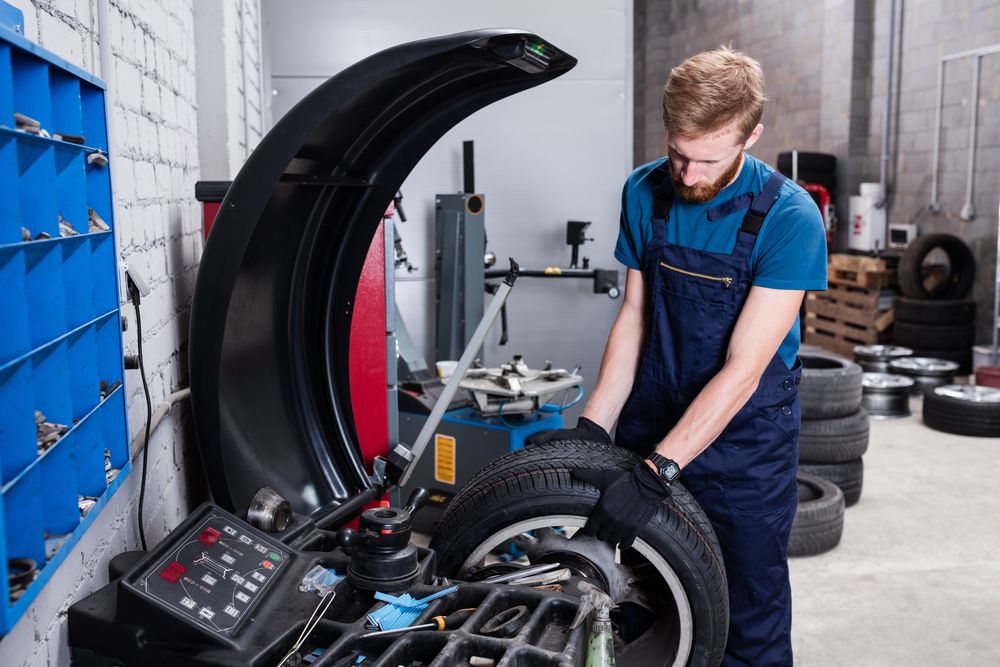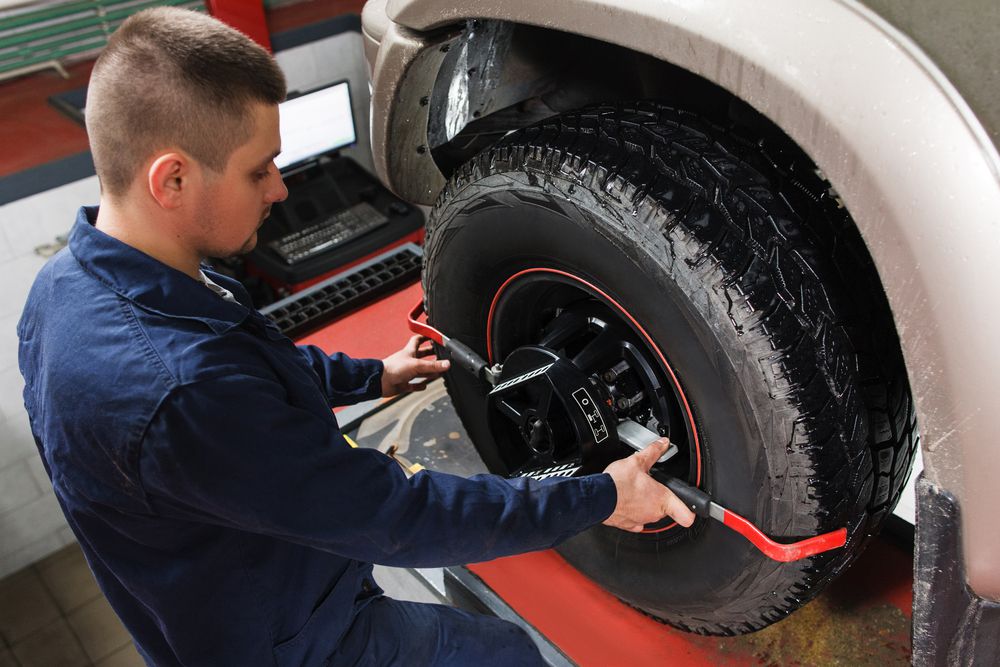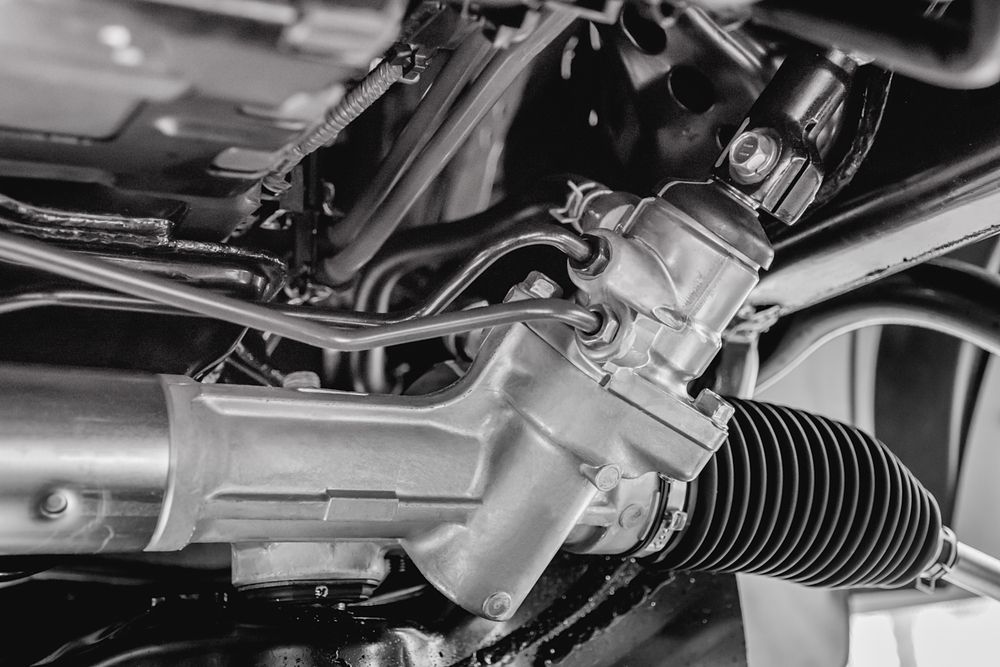
Wondering is it safe to drive with a steering wheel that shakes, and what would cause the steering wheel to shake?
It's usually not safe to drive with a shaking steering wheel. Causes of a shaking steering wheel may be a tire out of balance, a brake problem, worn steering or suspension bushing, or something else. In any case, it will affect your ability to steer your vehicle safely and could quickly worsen, so it's advisable to book an appointment with the mechanic ASAP.
 Driving with a shaky steering wheel
Driving with a shaky steering wheel
Steering Wheel Shaking While Driving?
Driving down the highway, your steering wheel begins to shake?
A shaky steering wheel is a symptom of a problem that may pose a serious safety risk, but it may not be expensive to fix.
Why Is My Steering Wheel Shaking?
These reasons a steering wheel shakes include:
1. Unbalanced Tires
Tires out of balance are the most common cause of a shaking steering wheel and the simplest to get fixed.
Unbalanced tires usually cause more noticeable vibrations at higher speeds than low speeds in your steering wheel.
This issue occurs when your tires are unevenly worn or not weighted properly with tire weights.
The problem can usually be fixed quickly and inexpensively at a tire shop.
How Long Can You Drive On Unbalanced Tires?
If the cause of your wheel vibration is unbalanced tires, then you'll be safe to drive on them for quite a while, even a few months.
But because a steering wheel vibration can be pretty annoying and the fix is fast and cheap, it is best to take your vehicle to the shop as quickly as possible to get it fixed.
Unbalanced tires reduce fuel economy and adversely affect your vehicle's steering and suspension components like bushings.
 Mechanic balancing a tire on a tire balancing machine
Mechanic balancing a tire on a tire balancing machine
2. Misaligned Wheels
Over time, with daily driving over speed bumps, potholes, and rough roads, your wheels can go out of alignment.
Even hitting the curb a little too hard is enough to knock things out of whack.
When your wheels aren't out of alignment, you'll notice things like your vehicle won't maintain a straight line down the highway, and you will need to correct the steering wheel constantly.
Other symptoms of wheels out of alignment can be a shaky steering wheel.
You should get a wheel alignment done as soon as possible because it is not expensive and doesn't take too long in most cases.
If you put off a wheel alignment, your tires will quickly wear unevenly, costing you much more in the long run when you need to buy new tires.
 Mechanic checking the alignment of a tire
Mechanic checking the alignment of a tire
3. Brake System
Although this isn't quite as common as tire issues, a stuck brake caliper can also cause a steering wheel to vibrate.
When a brake caliper becomes stuck or seized, it can result in issues in handling, primarily with the steering wheel shaking or pulling.
If you notice a vibration in your steering wheel when braking, it's most likely due to badly warped rotors.
4. Worn Suspension
Another common cause of vibrations in steering wheels is a worn suspension system.
Components like shocks and coils directly influence the handling of your vehicle and cause a steering wheel to vibrate if they are malfunctioning.
This would probably be one of the most expensive things to fix but is also the least likely cause on our list.
5. Steering Rack
The final common cause of steering wheel vibrations is problems with the steering rack.
These problems include worn-out tie rods, mounting bushes, and internal gears.
Fixing steering components can be somewhat expensive and your vehicle will most likely have to spend a full day in the shop.
Troubleshooting Steering Wheel Shake
If you don't want to take your vehicle to a mechanic and try and troubleshoot the steering wheel vibrations yourself, you'll first want to examine any easy access and easily visible components.
Check your wheels, the suspension of your vehicle, the steering rack, and any internal parts that you can for any obvious signs of wear.
Steering Wheel Vibration At High Speeds?
Why is your car shaking when I drive over 60 mph?
Unbalanced tires are the most common cause of steering wheel vibrations when driving at higher speeds.
Another reason is that your tires are out of alignment. A way to check if your tires are misaligned is to drive your vehicle and pay attention to whether the steering wheel pulls in one direction and doesn't maintain a relatively straight line.
If it does, this is a misaligned tire issue.
Steering Wheel Shaking While Braking?
Vibrations in the steering wheel that become noticeable when braking is usually due to a brake or steering system problem.
As mentioned before, the most common cause of this can be worn or damaged rotors that need to be replaced.
Failing to replace your rotors can result in further complications to the braking system and can be dangerous.
Steering Wheel Shaking When Accelerating?
Most commonly, a steering wheel that shakes when accelerating to higher speeds is caused by unbalanced tires.
However, there can be more issues that cause this, too, such as:
Because there are so many issues it could be, it's recommended to take your vehicle to a mechanic for a proper diagnosis.
 Freshly installed power steering rack
Freshly installed power steering rack
Steering Wheel Shakes At Low Speeds?
If a vehicle shakes while being driven at a lower speed, this may be due to the brake calipers sticking.
However, other common causes of this can be flat tires or bent wheels, or axles.
It's important, in this case, to check your tires first to ensure that they are not the problem.
Steering Wheel Shakes Then Goes Away?
If your steering wheel is shaking suddenly and then stops, it may be due to the speed you were driving at versus the speed you're driving at now.
For example, if you're going 60mph down a freeway and notice the shaking only to reduce your speed to 40mph and the shaking stops, it is likely due to unbalanced tires.
Again, check your tires to see if you notice any problems.
Is It Safe To Drive With A Shaking Steering Wheel?
If your steering wheel is shaking and you do not know the cause, it is not safe to continue operating your vehicle.
There are many reasons your steering wheel could be shaking, including issues with your braking system.
If the issues are with your brakes, it's dangerous to continue driving on the chance that your brakes suddenly stop working; this could result in a car accident involving you and possibly other individuals.
Another potentially dangerous problem could occur if the lug nuts are loose, resulting in a tire falling off while you're traveling down the road.
However, if you're certain that the issue is due to misaligned wheels or unbalanced tires, it should be OK to drive your vehicle for a few months; however, you should realize that this can cause your vehicle to use up more gas than normal as it uses more power to drive with misaligned or unbalanced wheels.
How Do I Get My Steering Wheel To Stop Shaking?
The best and only way to get your steering wheel to stop shaking is to have it serviced or service it yourself if you possess the knowledge and tools.
However, to be sure of the actual problem, you should have your vehicle diagnosed by a trained mechanic.
How Much Does It Cost To Fix A Shaking Steering Wheel?
There is no set price to have a shaking steering wheel fixed.
Since a multitude of problems can cause a shaking steering wheel, there's no way for sure to gauge how much it will cost to have it fixed.
Plus, all mechanics and part stores vary in price.
As an example, here are some average prices:
Cost estimates to fix a shaky steering wheel
Misaligned Wheels |
$100-$150 |
Brake Calipers |
$100-$500 |
Brake Rotors |
$150-$200 per axle |
Worn Suspension |
$1,000-$5,000 |
Steering Rack |
$100-$500 |
Conclusion
The vibrations you feel through your steering wheel can have many different causes from wheel and tire issues to brake issues.
Whether or not it is safe to operate your vehicle when the wheeling is shaking will depend upon the cause of the vibrations.
If you're uncertain what is causing the wheel to shake, then it's a good idea not to operate your vehicle until you find out.
FAQs
How much steering wheel vibration is normal?
A small amount of vibration isn't a cause for concern, but any more than that signals that something is wrong.
What does death wobble feel like?
Death wobble feels like your vehicle shaking so violently that it feels like it's about to fall apart.
This usually occurs in bigger vehicles such as Jeeps and trucks and results from suspension or steering wheel problems.